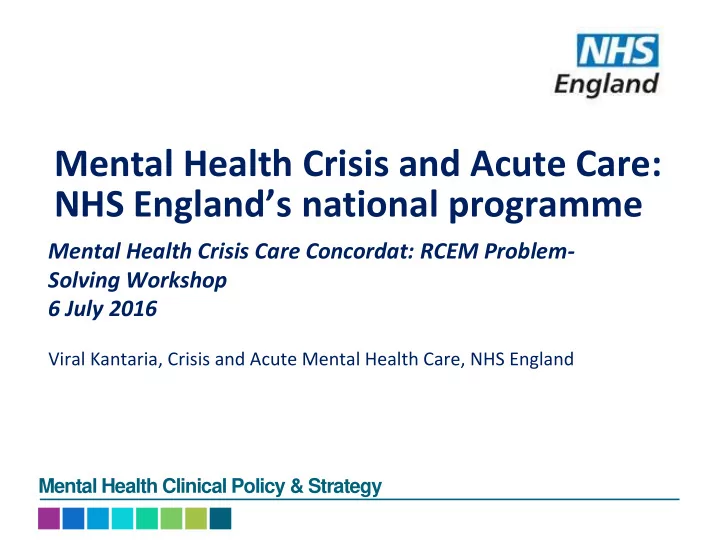

Mental Health Crisis and Acute Care: NHS England’s national programme Mental Health Crisis Care Concordat: RCEM Problem- Solving Workshop 6 July 2016 Viral Kantaria, Crisis and Acute Mental Health Care, NHS England Mental Health Clinical Policy & Strategy
CQC thematic review: Some excellent examples of innovation and practice; Concordat means every single area now has multi-agency commitment and a plan of action. However CQC found that….. variation ‘unacceptable’ - only 14% of people felt they were provided with the right response when in crisis – a particularly stark finding; More than 50% of areas unable to offer 24/7 support – MH crises mostly occur at between 11pm-7am - parity? Crisis resolution and home treatment teams not resourced to meet core service expectations; Only 36% of people with urgent mental health needs had a good experience in A&E - ‘unacceptably low’; Overstretched/insufficient community MH teams; Bed occupancy around 95% (85% is the recommended maximum) – 1/5 th people admitted over 20km away; People waiting too long or turned away from health-based places of safety 2
Mental Health Task Force – crisis and acute recommendations Recommendation 17: Recommendation 18: • • By 2020/21 24/7 community crisis response By 2020/21, no acute hospital is without across all areas that are adequately resourced all-age mental health liaison services in to offer intensive home treatment , backed by emergency departments and inpatient investment in CRHTTs. wards • • Equivalent model to be developed for At least 50 per cent of acute hospitals are CYP meeting the ‘core 24’ service standard as a minimum by 2020/21. Recommendation 22: • Recommendation 13: Introduce standards for acute mental health • Introduce a range of access and quality care , with the expectation that care is provided in the least restrictive way and as close to home as standards across mental health. This possible. includes: • Eliminate the practice of sending people out of 2016 - crisis care (under area for acute inpatient care as a result of local development) acute bed pressures by no later than 2020/21. 2016/17 – acute mental health care www.england.nhs.uk (yet to start) 3
Spending Review – Headlines for Crisis & Acute Care “ By 2020, there should be 24-hour access to mental health crisis care, 7 days a week, 365 days a year – a ‘7 Day NHS for people’s mental health’.” • over £400m for crisis resolution and home treatment teams (CRHTTs) to deliver 24/7 treatment in communities and homes as a safe and effective alternative to hospitals (over 4 years from 2017/18); • £247m for liaison mental health services in every hospital emergency department (over 4 years from 2017/18); • £15m capital funding for Health Based Places of Safety in 2016-18 (non- recurrent) www.england.nhs.uk 4
Our approach: evidence driven, collaborative and systematic Process of collaborative working with multi-stakeholder expert reference group Develop evidence based treatment pathway • Develop clinically informed access and quality standards (including clock start / stop, • interventions and outcome metrics) Develop dataset change specification and commission changes to relevant NHS datasets • Conduct baseline audit, gap analysis, opportunities analysis and change modelling. • Develop and publish implementation guidance • Establish quality assessment and improvement / accreditation scheme • Support the development of regional preparedness / improvement networks • Ensure alignment of effective lever and incentive systems across ALBs • Joint working with HSCIC, HEE and NHSI critical throughout www.england.nhs.uk
Programme scope Crisis Care – urgent crisis Acute Care - (just beginning, response - (underway, phase 1) phase 2): Primary care response (in and OOH) SELF MGT & CARE PLANNNG • Alternatives to admission – crisis & USE OF DIGITAL TECHNOLOGY 111 (and the DoS) and 999 respite houses, family placements • 24/7 MH crisis line (tele-triage & tele- 24/7 intensive home treatment as alternative to admission health) and 24/7 community-based crisis response • Acute day care ‘Blue light’ response, transport hub, • Acute inpatient services S135/136 response & health based • PICU services places of safety • Acute system management, out of Urgent and emergency mental health area placements, DToCs liaison in acute hospitals (A&E and Outside the scope of UEC payment wards) (+alcohol care teams) model(s), likely to be considered in Within the scope of UEC payment model(s) context of new MH payment models. Must ensure that we take a joined up approach for people with co-existing MH and substance misuse conditions… www.england.nhs.uk 6
What have we been focussing on, and what will we be focussing on? • Data & datasets!!!!! Preventable causes of crises? • CCG Improvement & Assessment Framework • Crisis care as part of mental health & UEC elements of STPs • Embedding within UEC Review & Vanguards progs • Expert Reference Groups helping develop evidence- based treatment pathways Example from Southend CCG 7
To note..… To ask….. Who commissions what , CQC report not about and from whom ? blame – highlighted need to equip EDs adequately To whom do the benefits of ED liaison accrue – other than patients?(!) ED liaison one part of wider UEC system – focus How to share information & also on 24/7 community- make care records accessible in the ED? based crisis response Workforce: numbers/skill Multi-year transformation mix /competencies? programme : rebalancing Managing s trong the system including interdependencies with primary and community other partners e.g. housing, care social care, public health? www.england.nhs.uk 8
Recommend
More recommend